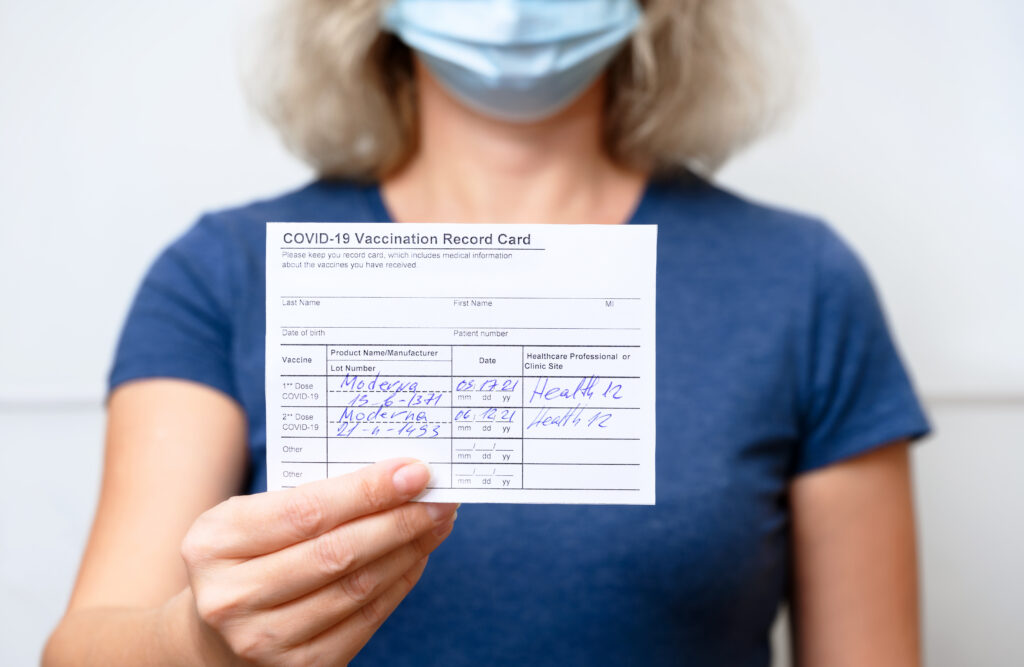
Currently there are two mandates requiring private employers to ensure that their employees are vaccinated for COVID-19. Under President Biden’s Executive Order 14042, Federal Contractors and Subcontractors are required to have their employees receive a COVID-19 vaccination unless they are eligible for a legal exemption (medical disability or religious exemption). Under the U.S. Department of Labor’s Occupational Safety and Health Administration (OSHA) Emergency Temporary Standard (ETS), employers with 100 or more employees are required to have their employees receive a COVID-19 vaccination or submit to weekly testing and wear a face covering in the workplace.
OSHA’s ETS requirements for employers with over 100 employees state that they must develop, implement, and enforce either a mandatory COVID-19 employee-vaccination policy or a policy requiring employees who are not fully vaccinated to take weekly COVID-19 tests and wear a face covering when present in the workplace. Vaccinations are required by January 4th, 2022, but all unvaccinated workers must begin wearing masks by December 6, 2021, and provide a negative COVID-19 test on a weekly basis starting January 4th, 2022.
The OSHA’s ETS requirements are currently being challenged in court and however, with the tight timeline and fines for non-compliance up to $13,653 for each violation it is only prudent to start enacting a program now. Please contact FosterThomas for assistance and refer to the following for some takeaways and additional guidance:
SHRM’s Top Takeaways from the OSHA ETS:
- Employers are required to have a written vaccination policy.
- The OSHA ETS does not apply to employees who do not report to a workplace where there are other individuals such as coworkers or customers are present; employees working from home; or employees who work exclusively outdoors.
- The OSHA ETS does not require employers to provide or pay for tests.
- Employers must pay employees for the time it takes to get vaccinated
- (Up to how many hours though??) What’s reasonable??
- Employers must ensure all unvaccinated employees are masked.
- Employers must report COVID-19 fatalities and hospitalizations to OSHA.
- The OSHA ETS reaffirms that employers must provide reasonable accommodations.
OSHA ETS Fact Sheet
https://www.osha.gov/sites/default/files/publications/OSHA4161.pdf
Complete Code of Federal Regulation
https://www.govinfo.gov/content/pkg/FR-2021-11-05/pdf/2021-23643.pdf
Executive Order 14042 has a deadline for Federal Contractors and Sub Contractors to be fully vaccinated that was initially December 8th and January 4th. This deadline has now been pushed back to January 18th. There is no option for weekly testing for those impacted by these Executive Orders. However, it remains clear that disabled employees who cannot safely be vaccinated and those with sincerely held religious beliefs precluding vaccination may need to be accommodated.
The Equal Employment Opportunity Commission (EEOC) recently provided guidance to employers who are grappling with how they protect their workforce and assess medical or religious accommodation requests. Medical exemptions are more straight forward, while religious exemptions have little objective evidence that can support the employer’s decision. The updated EEOC guidance now includes a section “L” entitled “Vaccinations-Title VII and Religious Objections to COVID-19 Vaccine Mandates”. While accommodations may differ for federal contractors and private employers, the EEOC offered the following general guidance in handing such accommodation requests:
- As a best practice, the EEOC recommends that employers introducing a mandatory COVID-19 vaccination policy notify all employees that the employer will consider requests for reasonable accommodation on an individual basis. Applicants and employees must inform their employer if they need an exception to the COVID-19 vaccine requirements due to a conflict with a disability-related reason or sincerely held religious belief, practice or observance.
- Employers must consider reasonable accommodations for workers who refuse a vaccine for disability or religious reasons unless such accommodations pose an undue hardship on the employer’s operations. Under Title VII, courts define “undue hardship” as having more than minimal cost or burden on the employer. The accommodation and undue hardship analysis must consider changing circumstances, therefore, the accommodation may be changed or discontinued.
- Employers should assume that a religious accommodation request is based on a sincerely held religious belief. However, if the employer doubts the sincerity of the request, the employer is permitted to ask limited factual questions to assess the employee’s sincerity. The EEOC clarified that Title VII does not protect social, political, or economic views or personal preferences.
- Granting accommodation requests for one employee does not mean an employer has to grant all religious accommodation requests. Employers may consider factors such as the type of workplace, the nature of the employee’s duties, the number of employees who are fully vaccinated, etc. An employer may consider the cumulative cost or burden of granting accommodations to other employees when determining whether to grant an exemption to vaccine requirements.
- The information that the employee provides about vaccination status, such as a copy of a vaccination card is considered medical information. Medical information must be maintained confidentially in a file separate from an employee’s regular employment file.
If an employee is granted an accommodation, there are safety protocols that the employee must follow including If an employee is granted an accommodation, there are safety protocols that the employee must follow including masking, physical distancing and testing protocols. The Coronavirus situation is fluid and laws are changing rapidly. Employers must consider state law and CDC guidance in these matters as well. Legal challenges to the mandates are expected. Please contact FosterThomas for assistance and continue to check the following websites for continued updates.
